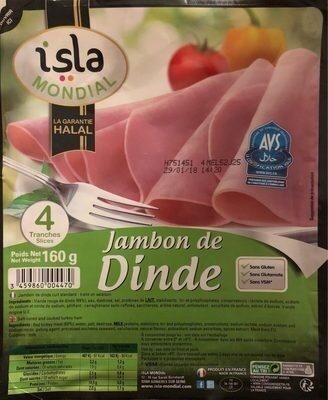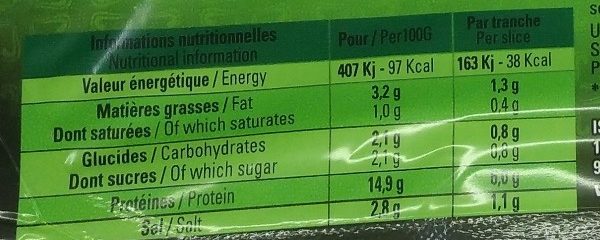Help us make food transparency the norm!
As a non-profit organization, we depend on your donations to continue informing consumers around the world about what they eat.
The food revolution starts with you!
Jambon de dinde halal - Isla Mondial - 160 g
Jambon de dinde halal - Isla Mondial - 160 g
This product page is not complete. You can help to complete it by editing it and adding more data from the photos we have, or by taking more photos using the app for Android or iPhone/iPad. Thank you!
×
Barcode: 3459860004470 (EAN / EAN-13)
Common name: Jambon de dinde cuit standard - traité en salaison
Quantity: 160 g
Packaging: Plastic, Fresh, Tray
Brands: Isla Mondial
Categories: Meats and their products, Meats, Prepared meats, fr:Charcuteries cuites, Poultry hams, Cooked turkey breast slices
Labels, certifications, awards:
No gluten, Halal, Made in France, No flavour enhancer, No MSG, fr:A Votre Service, Triman, fr:Sans viande séparée mécaniquement


Origin of ingredients: European Union
Manufacturing or processing places: France
Traceability code: FR 56.166.001 CE - Plouay (Morbihan, France)
Stores: carrefour.fr
Countries where sold: France
Matching with your preferences
Health
Ingredients
-
19 ingredients
: Viande rouge de dinde (69 %), eau, sel, dextrose, protéines de LAIT, stabilisants : tri - et polyphosphates, conservateurs : lactate de sodium, acétate de sodium, nitrite de sodium, gélifiant : carraghénanes, saccharose, arôme naturel, antioxydant : ascorbate de sodium, extrait d'épices.Allergens: MilkTraces: Gluten, Mustard, Soybeans
Food processing
-
Ultra processed foods
Elements that indicate the product is in the 4 - Ultra processed food and drink products group:
- Additive: E325 - Sodium lactate
- Additive: E407 - Carrageenan
- Additive: E452 - Polyphosphates
- Ingredient: Dextrose
- Ingredient: Flavouring
- Ingredient: Gelling agent
- Ingredient: Glucose
- Ingredient: Milk proteins
Food products are classified into 4 groups according to their degree of processing:
- Unprocessed or minimally processed foods
- Processed culinary ingredients
- Processed foods
- Ultra processed foods
The determination of the group is based on the category of the product and on the ingredients it contains.
Additives
-
E250 - Sodium nitrite
Sodium nitrite: Sodium nitrite is the inorganic compound with the chemical formula NaNO2. It is a white to slightly yellowish crystalline powder that is very soluble in water and is hygroscopic. It is a useful precursor to a variety of organic compounds, such as pharmaceuticals, dyes, and pesticides, but it is probably best known as a food additive to prevent botulism. It is on the World Health Organization's List of Essential Medicines, the most important medications needed in a basic health system.Nitrate or nitrite -ingested- under conditions that result in endogenous nitrosation has been classified as "probably carcinogenic to humans" by International Agency for Research on Cancer -IARC-.Source: Wikipedia
-
E262 - Sodium acetates
Sodium acetate: Sodium acetate, CH3COONa, also abbreviated NaOAc, is the sodium salt of acetic acid. This colorless deliquescent salt has a wide range of uses.Source: Wikipedia
-
E262i - Sodium acetate
Sodium acetate: Sodium acetate, CH3COONa, also abbreviated NaOAc, is the sodium salt of acetic acid. This colorless deliquescent salt has a wide range of uses.Source: Wikipedia
-
E301 - Sodium ascorbate
Sodium ascorbate: Sodium ascorbate is one of a number of mineral salts of ascorbic acid -vitamin C-. The molecular formula of this chemical compound is C6H7NaO6. As the sodium salt of ascorbic acid, it is known as a mineral ascorbate. It has not been demonstrated to be more bioavailable than any other form of vitamin C supplement.Sodium ascorbate normally provides 131 mg of sodium per 1‚000 mg of ascorbic acid -1‚000 mg of sodium ascorbate contains 889 mg of ascorbic acid and 111 mg of sodium-. As a food additive, it has the E number E301 and is used as an antioxidant and an acidity regulator. It is approved for use as a food additive in the EU, USA, and Australia and New Zealand.In in vitro studies, sodium ascorbate has been found to produce cytotoxic effects in various malignant cell lines, which include melanoma cells that are particularly susceptible.Source: Wikipedia
-
E325 - Sodium lactate
Sodium lactate: Sodium lactate is the sodium salt of lactic acid, and has a mild saline taste. It is produced by fermentation of a sugar source, such as corn or beets, and then, by neutralizing the resulting lactic acid to create a compound having the formula NaC3H5O3.Source: Wikipedia
-
E407 - Carrageenan
Carrageenan (E407), derived from red seaweed, is widely employed in the food industry as a gelling, thickening, and stabilizing agent, notably in dairy and meat products.
It can exist in various forms, each imparting distinct textural properties to food.
However, its degraded form, often referred to as poligeenan, has raised health concerns due to its potential inflammatory effects and its classification as a possible human carcinogen (Group 2B) by the International Agency for Research on Cancer (IARC).
Nevertheless, food-grade carrageenan has been deemed safe by various regulatory bodies when consumed in amounts typically found in food.
Ingredients analysis
-
Palm oil free
No ingredients containing palm oil detected
Unrecognized ingredients: fr:viande-rouge-de-dinde, fr:triSome ingredients could not be recognized.
We need your help!
You can help us recognize more ingredients and better analyze the list of ingredients for this product and others:
- Edit this product page to correct spelling mistakes in the ingredients list, and/or to remove ingredients in other languages and sentences that are not related to the ingredients.
- Add new entries, synonyms or translations to our multilingual lists of ingredients, ingredient processing methods, and labels.
If you would like to help, join the #ingredients channel on our Slack discussion space and/or learn about ingredients analysis on our wiki. Thank you!
-
Non-vegan
Non-vegan ingredients: Milk proteinsSome ingredients could not be recognized.
We need your help!
You can help us recognize more ingredients and better analyze the list of ingredients for this product and others:
- Edit this product page to correct spelling mistakes in the ingredients list, and/or to remove ingredients in other languages and sentences that are not related to the ingredients.
- Add new entries, synonyms or translations to our multilingual lists of ingredients, ingredient processing methods, and labels.
If you would like to help, join the #ingredients channel on our Slack discussion space and/or learn about ingredients analysis on our wiki. Thank you!
-
Vegetarian status unknown
Unrecognized ingredients: fr:viande-rouge-de-dinde, fr:triSome ingredients could not be recognized.
We need your help!
You can help us recognize more ingredients and better analyze the list of ingredients for this product and others:
- Edit this product page to correct spelling mistakes in the ingredients list, and/or to remove ingredients in other languages and sentences that are not related to the ingredients.
- Add new entries, synonyms or translations to our multilingual lists of ingredients, ingredient processing methods, and labels.
If you would like to help, join the #ingredients channel on our Slack discussion space and/or learn about ingredients analysis on our wiki. Thank you!
-
Details of the analysis of the ingredients
We need your help!
Some ingredients could not be recognized.
We need your help!
You can help us recognize more ingredients and better analyze the list of ingredients for this product and others:
- Edit this product page to correct spelling mistakes in the ingredients list, and/or to remove ingredients in other languages and sentences that are not related to the ingredients.
- Add new entries, synonyms or translations to our multilingual lists of ingredients, ingredient processing methods, and labels.
If you would like to help, join the #ingredients channel on our Slack discussion space and/or learn about ingredients analysis on our wiki. Thank you!
: Viande rouge de dinde 69%, eau, sel, dextrose, protéines de LAIT, stabilisants (tri), polyphosphates, conservateurs (lactate de sodium), acétate de sodium, nitrite de sodium, gélifiant (carraghénanes), saccharose, arôme naturel, antioxydant (ascorbate de sodium), extrait d'épices- Viande rouge de dinde -> fr:viande-rouge-de-dinde - percent_min: 69 - percent: 69 - percent_max: 69
- eau -> en:water - vegan: yes - vegetarian: yes - ciqual_food_code: 18066 - percent_min: 2.21428571428571 - percent_max: 31
- sel -> en:salt - vegan: yes - vegetarian: yes - ciqual_food_code: 11058 - percent_min: 0 - percent_max: 2.75
- dextrose -> en:dextrose - vegan: yes - vegetarian: yes - ciqual_proxy_food_code: 31016 - percent_min: 0 - percent_max: 2.75
- protéines de LAIT -> en:milk-proteins - vegan: no - vegetarian: yes - percent_min: 0 - percent_max: 2.75
- stabilisants -> en:stabiliser - percent_min: 0 - percent_max: 2.75
- tri -> fr:tri - percent_min: 0 - percent_max: 2.75
- polyphosphates -> en:e452 - vegan: yes - vegetarian: yes - percent_min: 0 - percent_max: 2.75
- conservateurs -> en:preservative - percent_min: 0 - percent_max: 2.75
- lactate de sodium -> en:e325 - vegan: yes - vegetarian: yes - percent_min: 0 - percent_max: 2.75
- acétate de sodium -> en:e262i - vegan: yes - vegetarian: yes - percent_min: 0 - percent_max: 2.75
- nitrite de sodium -> en:e250 - vegan: yes - vegetarian: yes - percent_min: 0 - percent_max: 2.75
- gélifiant -> en:gelling-agent - percent_min: 0 - percent_max: 2.75
- carraghénanes -> en:e407 - vegan: yes - vegetarian: yes - percent_min: 0 - percent_max: 2.75
- saccharose -> en:sucrose - vegan: yes - vegetarian: yes - ciqual_proxy_food_code: 31016 - percent_min: 0 - percent_max: 2.1
- arôme naturel -> en:natural-flavouring - vegan: maybe - vegetarian: maybe - percent_min: 0 - percent_max: 2.1
- antioxydant -> en:antioxidant - percent_min: 0 - percent_max: 2.1
- ascorbate de sodium -> en:e301 - vegan: yes - vegetarian: yes - percent_min: 0 - percent_max: 2.1
- extrait d'épices -> en:spice-extract - vegan: yes - vegetarian: yes - percent_min: 0 - percent_max: 2.1
Nutrition
-
Poor nutritional quality
⚠ ️Warning: the amount of fiber is not specified, their possible positive contribution to the grade could not be taken into account.⚠ ️Warning: the amount of fruits, vegetables and nuts is not specified on the label, it was estimated from the list of ingredients: 0This product is not considered a beverage for the calculation of the Nutri-Score.
Positive points: 0
- Proteins: 5 / 5 (value: 14.9, rounded value: 14.9)
- Fiber: 0 / 5 (value: 0, rounded value: 0)
- Fruits, vegetables, nuts, and colza/walnut/olive oils: 0 / 5 (value: 0, rounded value: 0)
Negative points: 11
- Energy: 1 / 10 (value: 406, rounded value: 406)
- Sugars: 0 / 10 (value: 2.1, rounded value: 2.1)
- Saturated fat: 0 / 10 (value: 1, rounded value: 1)
- Sodium: 10 / 10 (value: 1100, rounded value: 1100)
The points for proteins are not counted because the negative points are greater or equal to 11.
Nutritional score: (11 - 0)
Nutri-Score:
-
Nutrient levels
-
Fat in moderate quantity (3.2%)
What you need to know- A high consumption of fat, especially saturated fats, can raise cholesterol, which increases the risk of heart diseases.
Recommendation: Limit the consumption of fat and saturated fat- Choose products with lower fat and saturated fat content.
-
Saturated fat in low quantity (1%)
What you need to know- A high consumption of fat, especially saturated fats, can raise cholesterol, which increases the risk of heart diseases.
Recommendation: Limit the consumption of fat and saturated fat- Choose products with lower fat and saturated fat content.
-
Sugars in low quantity (2.1%)
What you need to know- A high consumption of sugar can cause weight gain and tooth decay. It also augments the risk of type 2 diabetes and cardio-vascular diseases.
Recommendation: Limit the consumption of sugar and sugary drinks- Sugary drinks (such as sodas, fruit beverages, and fruit juices and nectars) should be limited as much as possible (no more than 1 glass a day).
- Choose products with lower sugar content and reduce the consumption of products with added sugars.
-
Salt in high quantity (2.75%)
What you need to know- A high consumption of salt (or sodium) can cause raised blood pressure, which can increase the risk of heart disease and stroke.
- Many people who have high blood pressure do not know it, as there are often no symptoms.
- Most people consume too much salt (on average 9 to 12 grams per day), around twice the recommended maximum level of intake.
Recommendation: Limit the consumption of salt and salted food- Reduce the quantity of salt used when cooking, and don't salt again at the table.
- Limit the consumption of salty snacks and choose products with lower salt content.
-
-
Nutrition facts
Nutrition facts As sold
for 100 g / 100 mlCompared to: Cooked turkey breast slices Energy 406 kj
(97 kcal)-1% Fat 3.2 g +98% Saturated fat 1 g +89% Carbohydrates 2.1 g +9% Sugars 2.1 g +151% Fiber ? Proteins 14.9 g -19% Salt 2.75 g +42% Fruits‚ vegetables‚ nuts and rapeseed‚ walnut and olive oils (estimate from ingredients list analysis) 0 %
Environment
-
Eco-Score D - High environmental impact
⚠ ️Select a country in order to include the full impact of transportation.The Eco-Score is an experimental score that summarizes the environmental impacts of food products.→ The Eco-Score was initially developped for France and it is being extended to other European countries. The Eco-Score formula is subject to change as it is regularly improved to make it more precise and better suited to each country.Life cycle analysis
-
Average impact of products of the same category: D (Score: 35/100)
Category: Turkey cooked ham, in slices
Category: Turkey cooked ham, in slices
- PEF environmental score: 0.88 (the lower the score, the lower the impact)
- including impact on climate change: 6.82 kg CO2 eq/kg of product
Stage Impact Agriculture
83.5 %Processing
11.0 %Packaging
2.0 %Transportation
2.2 %Distribution
1.0 %Consumption
0.3 %
Bonuses and maluses
-
Origins of ingredients with a high impact
Malus: -5
Environmental policy: -5
Transportation: 0
Origin of the product and/or its ingredients % of ingredients Impact European Union 100 %High
-
Packaging with a medium impact
Malus: -10
Shape Material Recycling Impact Tray Plastic High
Eco-Score for this product
-
Impact for this product: D (Score: 20/100)
Product: Jambon de dinde halal - Isla Mondial - 160 g
Life cycle analysis score: 35
Sum of bonuses and maluses: -15
Final score: 20/100
-
Carbon footprint
-
Equal to driving 3.5 km in a petrol car
682 g CO² per 100g of product
The carbon emission figure comes from ADEME's Agribalyse database, for the category: Turkey cooked ham, in slices (Source: ADEME Agribalyse Database)
Stage Impact Agriculture
75.9 %Processing
15.8 %Packaging
4.0 %Transportation
3.6 %Distribution
0.5 %Consumption
0.1 %
Packaging
-
Packaging with a medium impact
-
Packaging parts
Tray (Plastic)
-
Packaging materials
Material % Packaging weight Packaging weight per 100 g of product Plastic
-
Transportation
-
Origins of ingredients
Origins of ingredients with a high impact
Origin of the product and/or its ingredients % of ingredients Impact European Union 100 %High
Report a problem
-
Incomplete or incorrect information?
Category, labels, ingredients, allergens, nutritional information, photos etc.
If the information does not match the information on the packaging, please complete or correct it. Open Food Facts is a collaborative database, and every contribution is useful for all.
Data sources
Product added on by agamitsudo
Last edit of product page on by teolemon.
Product page also edited by date-limite-app, desan, driveoff, floriane-yuka, kiliweb, moon-rabbit, openfoodfacts-contributors, packbot, quentinbrd, sebleouf, yuka.DbkTPPKtDpd-F8H98IMGwAO8DPz4L9BdIl0sow, yuka.WC9rd0xmOGYvdk1FeXNRT3dTSG4rZlZFN0lld1pHem5PL1FlSWc9PQ.











